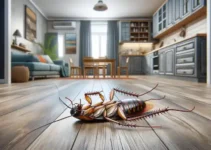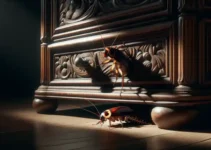Cockroaches are annoying, spread diseases, and cause allergic reactions. You know you have a cockroach infestation if you see their droppings. Now, you have to know how to clean up cockroach droppings for the sake of maintaining a healthy living environment. This guide will help know how to identify and remove the droppings.
Do Cockroaches Leave Droppings?
Yes, cockroaches do leave droppings. Their droppings are one of the main ways to identify their presence in your home. Cockroaches are nocturnal insects, which means they are most active at night when you are likely asleep. During their nightly activities, they leave behind droppings that can be found in various places around your home. These droppings can accumulate over time and may cause health issues if not cleaned up promptly.
If you spot the droppings early, that helps to take action before the infestation becomes severe. You just need to know what to look for, which can make a big difference in controlling a cockroach problem. Pay attention to signs of droppings in your kitchen, bathroom, and other areas where food and water are present—these are common places where they visit.
What Do Cockroach Droppings Look Like?
The look of cockroach droppings depends on the type of cockroach and their diet. Generally, cockroach droppings look like small, dark specks or pellets. They can be similar in size and shape to ground coffee or black pepper. Larger cockroach species, such as the American cockroach, may leave behind bigger droppings that resemble small grains of rice.
You might find these droppings in areas where cockroaches are active, such as kitchens, bathrooms, and dark, hidden spaces. The droppings may also have a musty or oily odor. With these signs revealed to you, your next move will be to determine if you have a cockroach problem and take steps to address it. Sometimes, cockroach droppings can be mistaken for mouse droppings, but mouse droppings are generally larger and more uniform in size.
Now, let’s proceed to the best course of action to take for pest control. You’d also have to check under appliances, inside cabinets, and around food storage areas for any signs of droppings.
How to Clean Cockroach Poop
Follow these steps to clean up the cockroach poop properly and reduce the risk of health issues.
1. Wear Gloves and a Mask
Before you start cleaning, you want to protect yourself. Wear disposable gloves to avoid direct contact with the droppings. Cockroach droppings can carry bacteria and allergens that can be harmful. You also need a mask to prevent inhaling any particles that might be stirred up during cleaning. Safety first!
It’s also a good idea to wear long sleeves and pants to avoid any contact with your skin.
2. Disinfect Surfaces
Once you have your gloves and mask on, the next step is to disinfect the surfaces where you found the droppings. Use a disinfectant spray or a solution of water and bleach. Spray the area thoroughly and let it sit for a few minutes to kill any bacteria. After letting it sit, wipe the area with a clean cloth or paper towels. Make sure to dispose of the cloth or paper towels properly after use.
Cockroach droppings can harbor pathogens that cause diseases. Taking the time to clean thoroughly helps to protect your family’s health. Don’t forget to clean any tools you use during the process to remove any lingering odor that might attract more cockroaches.
3. Vacuum the Roach Droppings
Use a vacuum cleaner to remove cockroach droppings. Make sure your vacuum has a HEPA filter, which can trap tiny particles. Vacuum up all visible droppings carefully. This method helps to avoid spreading any particles into the air. After vacuuming, empty the vacuum cleaner bag or canister outside your home to prevent any remaining particles from re-entering your living space.
A vacuum cleaner is especially useful for cleaning up droppings from carpets and other soft surfaces. Be thorough in your vacuuming to ensure that all traces of the droppings are removed. Regular vacuuming can also help to keep your home free from other allergens. For hard-to-reach places, consider using a vacuum attachment to get into corners and crevices where droppings might accumulate.
4. Seal Up Cracks and Crevices
Cockroaches often enter homes through small cracks and crevices. To prevent future infestations, it’s important to seal these entry points. Check areas around windows, doors, and baseboards for any gaps. Use caulk or weather stripping to seal these openings. This will help keep cockroaches out and reduce the chances of them coming back. Regularly inspect these areas and re-seal them as needed. Taking these preventive measures can make a big difference in keeping your home cockroach-free.
In addition to sealing cracks and crevices, consider installing door sweeps on exterior doors and repairing any damaged screens on windows. These additional steps can further reduce the likelihood of cockroaches finding a way into your home. Maintaining these barriers is key to long-term prevention. It also helps to check for and seal any gaps around plumbing and electrical fixtures where cockroaches might enter. Keeping these areas secure helps to create a more robust defense against infestations.
5. Take Measures to Keep Home Clean
Make sure to store food in sealed containers and clean up any spills or crumbs right away. Regularly take out the trash and keep trash bins covered. Don’t leave dirty dishes in the sink overnight, and make sure to sweep and mop your floors regularly. Also, try to reduce clutter, as cockroaches love to hide in piles of papers, boxes, and other items. A clean and tidy home makes it less attractive for cockroaches to settle in.
6. Contact Your Local Pest Control Professional for Extermination
If you have a severe cockroach infestation, it’s best to call a professional pest control service to handle the problem. A pest control professional will assess the situation, identify the extent of the infestation, and use appropriate treatments to eliminate the cockroaches. Don’t hesitate to seek professional help if your efforts to control the cockroach problem on your own are not successful.
Read Also: What Do Roaches Eat When There Is No Food?

